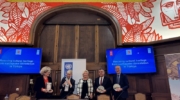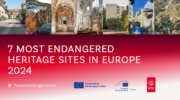European Heritage Hub announces grants to 14 heritage projects in EU neighbouring countries and calls for increased funding
The European Heritage Hub, a pilot project co-funded by the EU connecting heritage stakeholders across Europe, has selected 14 heritage projects across 11 EU neighbouring countries for its Small Grants Scheme (see the full list of projects below). A total of around 250,000 EUR has been allocated to the selected initiatives led by civil society organisations, distributed among small, medium, and large-scale grants. The Scheme is run by Europa Nostra, as Project Leader of the European Heritage Hub, in consultation with other members of the Hub consortium, and is co-funded by ALIPH Foundation.

Credits: European Heritage Hub
The Small Grants Scheme supports civil society-led heritage projects in EU neighbouring countries (Albania, Armenia, Azerbaijan, Bosnia and Herzegovina, Georgia, Kosovo*, Moldova, Montenegro, North Macedonia, Serbia, Ukraine), aimed at enhancing their capacity to respond to Europe’s green, digital, and social transformation, as well as fostering peace, stability, reconciliation, and intercultural and interreligious dialogue. Running from January to March 2024, the Scheme’s call received an impressive total of 600 eligible submissions, reflecting the imperative need for increased support in these regions.
The selected projects highlight the fundamental role our shared heritage can and must play in the EU enlargement process. These initiatives range from bottom-up approaches showcasing diverse expertise to heritage promotion and educational activities to the inventory, mapping, or digitisation of monuments and sites, as well as the revival of war-torn towns. Despite their varied backgrounds, each project underscores how heritage fosters social inclusion and strengthens communities. This important potential should be further unleashed in the pursuit of the strategic goal of greater integration and sustainable development across Europe, especially in regions affected by or at risk of conflict.
The Selection Committee, comprising experts among the Hub project partners, shortlisted a larger number of outstanding initiatives. However, due to limited funding, at this stage only 14 projects could be supported. Meeting the needs of all initially shortlisted remarkable projects would require around 1 million EUR – four times the current funding available to the scheme.
“The extremely high number of submissions received demonstrates the relevance of such a funding scheme, but also highlights the lack of sufficient support for heritage civil society organisations that are dedicated to the protection and promotion of Europe’s shared heritage, both tangible and intangible. We are grateful for the vital initial funding provided by the EU and our partner ALIPH. We truly hope that other partners will follow their power of example. Together we shall aim to mobilise further public and private resources to make a real difference in EU neighbouring countries and demonstrate the value of cultural heritage in facilitating their stronger and better integration within the EU”, underlined Sneška Quaedvlieg-Mihailovic, Secretary General of Europa Nostra and Project Leader of the European Heritage Hub pilot project.

Credits: Shutterstock
“At ALIPH, we have seen first-hand how small grants can have a big impact. ALIPH was founded to finance on-the-ground cultural heritage protection initiatives, and this funding scheme responds directly to our ethos: to support local organisations, implementing concrete projects that contribute directly to the building blocks for peace – be it economic development, upskilling, tourism, intercultural dialogue and more”, added Valéry Freland, Executive Director of ALIPH, associate partner of the European Heritage Hub which has provided financial support for the launch of this Small Grants Scheme.
The European Heritage Hub pilot project will run for an initial two-year period from May 2023 to April 2025, with a possibility of its continuation in the form of a Preparatory Action supported by the EU. In its next phase, the Hub aims to continue the Small Grants Scheme and secure increased funding to meet the needs of civil society heritage stakeholders in EU neighbouring countries. The sustained continuation of this initiative is fundamental to unlocking the power of our shared heritage, fostering mutual respect and cultural understanding, promoting sustainable development, and enhancing social cohesion across Europe.
Selected Projects for the European Heritage Hub Small Grants Scheme 2024
“TRUST: Transhumance Resilience and Utilisation for Sustainable Transformation”, Reinforce Sustainability – Resu, ALBANIA
TRUST aims to preserve Albania’s Transhumance heritage by engaging stakeholders in climate-resilient solutions. Through documentation, workshops, and recommendations, the project fosters collaboration for sustainable management.
“Guardians of Heritage: Strengthening Armenia’s Cultural Safeguards”, Blue Shield Armenia – ARMENIA
This project will boost emergency preparedness in Armenia. It will provide training to cultural professionals and volunteers. Workshops in the cities of Ijevan, Berd, Goris, and Kapan will equip participants with skills for protecting cultural heritage.
“House of International Dialogue and Research (HIDR)”, International Forum Bosnia – BOSNIA AND HERZEGOVINA
The House of International Dialogue and Research (HIDR) integrates authorised heritage discourse with grassroots practices, fostering inclusive social trust. Its cornerstone, the International Summer School Youth and Heritage (ISSYH19), offers global youth direct engagement with heritage to aid societal resilience. Held in Sarajevo, Mostar, and Stolac, activities include commemorating the Old bridge’s reconstruction anniversary. Participants gain insights into its implications and develop a project proposal integrating heritage conservation into climate adaptation in Stolac.
“Digitization and Inventory of Cultural Heritage of Truso Valley”, NNLE Lomeki – GEORGIA
To preserve the monuments of the Truso valley, it is necessary to carry out a full inventory of the territory and assign the status of immovable monuments of cultural heritage. To provide digital access to the monuments, a website will be created where visitors can find information about them. The local community will be involved in the implementation of the project, highlighting their role in heritage preservation.
“Caucasus Traditional Building Revival (CTBR)”, Georgian Arts and Culture Center – GEORGIA / ARMENIA / AZERBAIJAN
This pilot project aims to promote traditional architecture in the South Caucasus, emphasising the use of sustainable materials like loam or wood. Activities include stakeholder engagement, heritage site documentation, and a final conference. It will contribute to regional cooperation, cultural understanding, and normalise living in traditional houses. Additionally, the project’s vision is to use European sustainable methodologies, showcasing cross-regional collaboration.
“HeritageReady: Emergency Planning for Cultural Preservation”, Education for Development and Cultural Outreach – Educo – KOSOVO*
Over the course of four months, this project aims to revitalise Prizren’s cultural heritage, particularly focusing on the first Hydropower Museum. An expert from a neighbouring country will provide specialised training to staff members on aspects of museum management, including curation techniques, emergency preparedness, and preservation strategies for the unique history and significance of the Hydropower Museum.
“Reviving Hemp Heritage in Kosovo and Serbia”, GAIA – KOSOVO*/SERBIA
This project aims at documenting traditional knowledge of hemp cultivation in Kosovo and Vojvodina (North Serbia) and promoting its potential in climate change mitigation, in particular in the construction and agricultural sectors. It includes research, a documentary production, a short publication, a study visit, and a workshop, with the objective to extract knowledge and wisdom from the past, for future utilisation of hemp production towards a more sustainable future.
“Unity in Cultural Diversity”, Public Association Resource Center UNIVERS – MOLDOVA
This project is focused on preserving and disseminating the cultural heritage of Moldova, Romania, and Ukraine. Through the development of an electronic library, theatrical productions, and the creation of thematic quiz games, the project seeks to create a platform for intercultural dialogue and education. The main goals include active participation of youth, preservation of heritage, and strengthening of cultural understanding.
“Sveti Stefan – Cultural Heritage of Paštrovići”, NGO Sveti Stefan naš dom – MONTENEGRO / SERBIA
This audiovisual project seeks to raise awareness about the endangered cultural property City Hotel Sveti Stefan and its Cultural Landscape. Through a dynamic narrative and stunning visuals, it will showcase the rich history of the island of Sveti Stefan and its significance to the cultural legacy of the Paštrovići region. Additionally, the project will empower the local community and promote the region’s gastronomic and cultural heritage as a cornerstone of sustainable development and cultural preservation, creating a bridge between the past, present, and future.
“Monitoring of Macedonian Modernist Heritage”, North Macedonian National Committee of the International Council on Monuments and Sites (ICOMOS) – NORTH MACEDONIA
This project will map and monitor the state of conservation of modernist heritage properties in North Macedonia and set up a related digital inventory/database. A quantitative and qualitative mapping of the properties will be conducted, determining their heritage values and significance. In addition, a snapshot assessment of the current preservation condition of their elements will be made, creating the first-of-its kind attempt to outline the scope of the modernist architectural heritage and its state of conservation performed in North Macedonia.
“Green Heritage Initiative”, Green Art Incubator – SERBIA
This project focuses on advocating for the contribution of organisations dedicated to the management and protection of immovable cultural heritage in achieving the global goals of preventing the further escalation of challenges related to climate change and environmental degradation. It will provide support for their preparedness in facing and responding to the consequences of the expected harmful effects of these phenomena on nature, society, and heritage.
“Cultural heritage at the heart of the uniqueness and revival of war-torn towns in Kherson Oblast”, NGO Urban Re-Public – UKRAINE
This project’s main objective is to identify the characteristic features and uniqueness of settlements, based on existing cultural heritage sites. An information space will be created followed by an official concept of recreation and revival of the settlements. All objects will be analysed in order to track their destiny during wartime and recommend their inclusion in protection registers based on their significance to the settlement, rather than the degree of damage.
“Stands commemorating the history of the Mariupol Drama Theatre”, NGO History in Hands – UKRAINE
This initiative aims to distribute Mariupol Drama Theatre stand kits to 20 museums and theatres across Ukraine. Through educational events, the project seeks to enlighten the public about the rich historical significance embodied in this architectural masterpiece.
Cities in ruins: restoration through design and architecture”, Public organisation Youth Space: Initiative, Intellect, Innovation – UKRAINE
This project discusses heritage restoration as well as innovative design solutions and developments, combining an exhibition by design students and a scientific conference. It emphasises the importance of restoring heritage, highlighting the principles of the circular economy. In addition, it encourages cooperation between hosting guests from Milan, Vienna, and Krakow, as well as local authorities and representatives of conflict-affected areas.
* All references to Kosovo, whether the territory, institutions or population, in this document shall be understood in full compliance with United Nations’ Security Council Resolution 1244 and without prejudice to the status of Kosovo.
TO FIND OUT MORE
Full press release
www.europeanheritagehub.eu
Europa Nostra
Christy Drummond, Communications Manager
cd@europanostra.org
+32 2 894 74 99
ALIPH
Sandra Bialystok, Director of Communications and Partnerships
sandra.bialystok@aliph-foundation.org
+41 79 897 48 89






